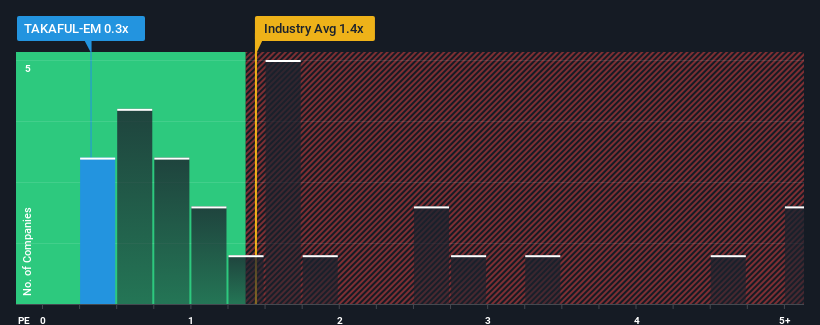- United Arab Emirates
- /
- Insurance
- /
- DFM:TAKAFUL-EM
Investors Don't See Light At End Of Takaful Emarat - Insurance (PSC)'s (DFM:TAKAFUL-EM) Tunnel And Push Stock Down 27%
The Takaful Emarat - Insurance (PSC) (DFM:TAKAFUL-EM) share price has softened a substantial 27% over the previous 30 days, handing back much of the gains the stock has made lately. Instead of being rewarded, shareholders who have already held through the last twelve months are now sitting on a 40% share price drop.
Even after such a large drop in price, when close to half the companies operating in the United Arab Emirates' Insurance industry have price-to-sales ratios (or "P/S") above 1.4x, you may still consider Takaful Emarat - Insurance (PSC) as an enticing stock to check out with its 0.3x P/S ratio. Nonetheless, we'd need to dig a little deeper to determine if there is a rational basis for the reduced P/S.
See our latest analysis for Takaful Emarat - Insurance (PSC)

What Does Takaful Emarat - Insurance (PSC)'s Recent Performance Look Like?
As an illustration, revenue has deteriorated at Takaful Emarat - Insurance (PSC) over the last year, which is not ideal at all. Perhaps the market believes the recent revenue performance isn't good enough to keep up the industry, causing the P/S ratio to suffer. Those who are bullish on Takaful Emarat - Insurance (PSC) will be hoping that this isn't the case so that they can pick up the stock at a lower valuation.
Although there are no analyst estimates available for Takaful Emarat - Insurance (PSC), take a look at this free data-rich visualisation to see how the company stacks up on earnings, revenue and cash flow.Do Revenue Forecasts Match The Low P/S Ratio?
There's an inherent assumption that a company should underperform the industry for P/S ratios like Takaful Emarat - Insurance (PSC)'s to be considered reasonable.
Retrospectively, the last year delivered a frustrating 31% decrease to the company's top line. As a result, revenue from three years ago have also fallen 21% overall. Accordingly, shareholders would have felt downbeat about the medium-term rates of revenue growth.
Comparing that to the industry, which is predicted to deliver 0.1% growth in the next 12 months, the company's downward momentum based on recent medium-term revenue results is a sobering picture.
In light of this, it's understandable that Takaful Emarat - Insurance (PSC)'s P/S would sit below the majority of other companies. Nonetheless, there's no guarantee the P/S has reached a floor yet with revenue going in reverse. There's potential for the P/S to fall to even lower levels if the company doesn't improve its top-line growth.
The Key Takeaway
The southerly movements of Takaful Emarat - Insurance (PSC)'s shares means its P/S is now sitting at a pretty low level. Typically, we'd caution against reading too much into price-to-sales ratios when settling on investment decisions, though it can reveal plenty about what other market participants think about the company.
Our examination of Takaful Emarat - Insurance (PSC) confirms that the company's shrinking revenue over the past medium-term is a key factor in its low price-to-sales ratio, given the industry is projected to grow. Right now shareholders are accepting the low P/S as they concede future revenue probably won't provide any pleasant surprises either. If recent medium-term revenue trends continue, it's hard to see the share price moving strongly in either direction in the near future under these circumstances.
Plus, you should also learn about these 3 warning signs we've spotted with Takaful Emarat - Insurance (PSC) (including 1 which shouldn't be ignored).
Of course, profitable companies with a history of great earnings growth are generally safer bets. So you may wish to see this free collection of other companies that have reasonable P/E ratios and have grown earnings strongly.
Valuation is complex, but we're here to simplify it.
Discover if Takaful Emarat - Insurance (PSC) might be undervalued or overvalued with our detailed analysis, featuring fair value estimates, potential risks, dividends, insider trades, and its financial condition.
Access Free AnalysisHave feedback on this article? Concerned about the content? Get in touch with us directly. Alternatively, email editorial-team (at) simplywallst.com.
This article by Simply Wall St is general in nature. We provide commentary based on historical data and analyst forecasts only using an unbiased methodology and our articles are not intended to be financial advice. It does not constitute a recommendation to buy or sell any stock, and does not take account of your objectives, or your financial situation. We aim to bring you long-term focused analysis driven by fundamental data. Note that our analysis may not factor in the latest price-sensitive company announcements or qualitative material. Simply Wall St has no position in any stocks mentioned.
About DFM:TAKAFUL-EM
Takaful Emarat - Insurance (PSC)
Engages in the takaful insurance activities in the United Arab Emirates.
Excellent balance sheet with acceptable track record.
Market Insights
Community Narratives




